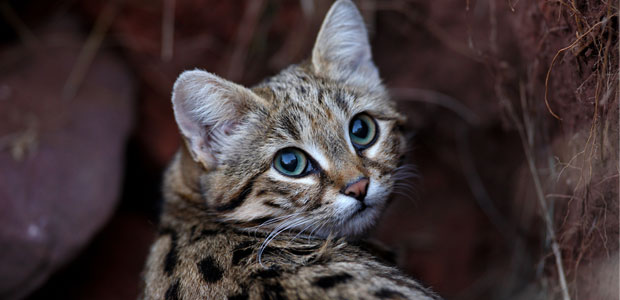Advertisement
Wildlife Wednesday: Black-Footed Cat
If it looks, meows, and purrs like the common house cat … in this case, it’s still not a house cat. On this Wildlife Wednesday, we learn about our domestic furry friend’s originally named (and very feral) cousin, the black-footed cat. Habitat These feral felines can be found in the African countries of Angola, Botswana, … Continued

If it looks, meows, and purrs like the common house cat … in this case, it’s still not a house cat. On this Wildlife Wednesday, we learn about our domestic furry friend’s originally named (and very feral) cousin, the black-footed cat.
Habitat
These feral felines can be found in the African countries of Angola, Botswana, Namibia, South Africa, and Zimbabwe. They make their homes in savannahs and other semi-desserts that have an abundance of long grasses … and tasty, tasty prey.
Trivia
- Thought to be the smallest feline in the world, black-footed cats weigh, on average, about 3 to 5 lbs (1 to 3 kg). By comparison, the average house cat weighs anywhere from 9 to 11 lbs (4 to 5 kg).
- There’s no getting stuck in trees for these little fellas. Unlike most cats, those of the black-footed variety are really not all that great at climbing.
- That, however, doesn’t stop them from being very capable hunters. Their list of prey includes small rodents, lizards, frogs, birds and their eggs, and their favourite feast … spiders.
- In their native Africa, these bold hunters are known as “anthill tigers” due to their habit of sleeping in hollowed out termite mounds, called anthills in African countries.
Why are they threatened?
So, they’re cute and they get rid of spiders. They should be roaming southern Africa with impunity, right? Well, as it turns out, that’s not really the case.
One major concern is habitat degradation, as more and more savannahs are being converted into agricultural space or are used as grazing lands for domestic livestock. Another issue is the use of poisons and other harsh methods to control rodents, which make up a large part of the cat’s diet.
That doesn’t mean, though, that conservation efforts aren’t in place. Hunting of the species is illegal in two of its native countries, and large swathes of the cat’s range are found in several protected parks, including the 180,000-hectare Addo Elephant National Park.





